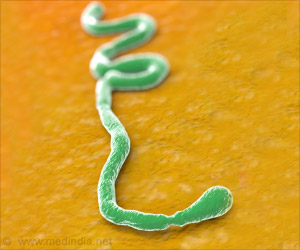- Ebola virus infection causes a severe and often fatal illness, and currently there are no preventive vaccines or treatment options.
- Emerging monoclonal antibody therapies are capable of neutralizing only one of the major disease-causing Ebola viruses.
- Current study has isolated two natural human antibodies that are effective and affords protection against all three major strains of Ebola viruses.
Emerging monoclonal antibody based treatments appear promising. However, even the most advanced among them, a mixture of three monoclonal antibodies, referred to as ZMappTM, is effective only against Ebola Zaire and not against the two related Ebola viruses, the Sudan virus and Bundibugyo virus which have also been responsible for major outbreaks.
Currently there are no existing vaccine effective against all the three major Ebola viruses.
"Since it's impossible to predict which of these agents will cause the next epidemic, it would be ideal to develop a single therapy that could treat or prevent infection caused by any known Ebola virus," says study co-leader Zachary A. Bornholdt, Ph.D., director of antibody discovery at Mapp Biopharmaceutical, Inc.
"Our discovery and characterization of broadly neutralizing human antibodies is an important step toward that goal," adds study co-leader, Kartik Chandran, Ph.D., professor of microbiology & immunology at Albert Einstein College of Medicine.
How The Current Study Identified The Antibody Effective Against All Major Ebola Viruses
During the present research, the multi-institutional research team identified that two of those 349 antibodies, referred to as ADI-15878 and ADI-15742, were able to strongly neutralize infection by all five known Ebola viruses in tissue culture.
Both antibodies were able to afford protection to animals (ferrets and mice) that had been exposed to a lethal dose of the three major viruses, namely the Ebola virus, Bundibugyo virus and Sudan virus.
Mechanism of Action of the Protective Ebola Antibody
The current research has also been able to outline how these protective antibodies work. In order to determine this they followed the path of the virus once it entered the body and the role of the protective antibodies in quelling the infection.
- The 2 neutralizing antibodies encounter the virus in the bloodstream and bind to glycoproteins on the surface of the virus.
- The virus with the bound antibody attaches to the host cell and gains entry into the lysosome, a cellular organelle that contains enzymes to digest unwanted cellular components as well as foreign material.
- To enter the host cytoplasm, where it can multiply, the virus has to fuse with the lysosomal membrane and complete a series of interactions to come out.
- However, the protective antibodies prevent the virus from coming out of its self-imposed lysosomal "prison," and snuffs out the infection at this point.
The research team has also zeroed in on the human genes that are the likely source of the immune cells giving rise to the two antibodies. The findings of the current study could show the way for development of treatment options and vaccines to prevent infection.
"We'd like to synthesize vaccine immunogens [proteins that trigger antibody production] that can elicit the same types of broadly protective antibodies in people," says Dr. Chandran.
References:
- Ebola virus entry into host cells: identifying therapeutic strategies - (https://www.ncbi.nlm.nih.gov/pmc/articles/PMC4617201/)
Source-Medindia














